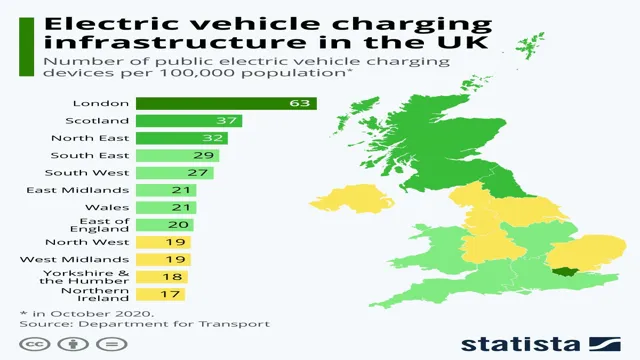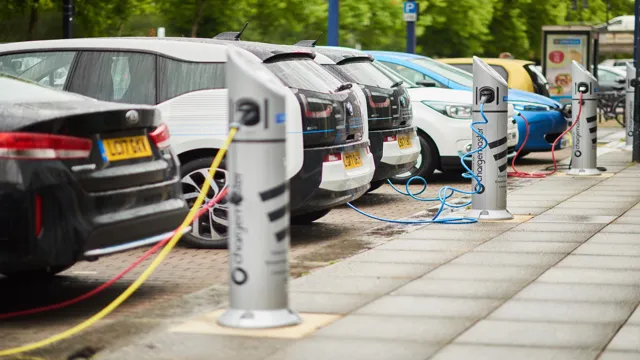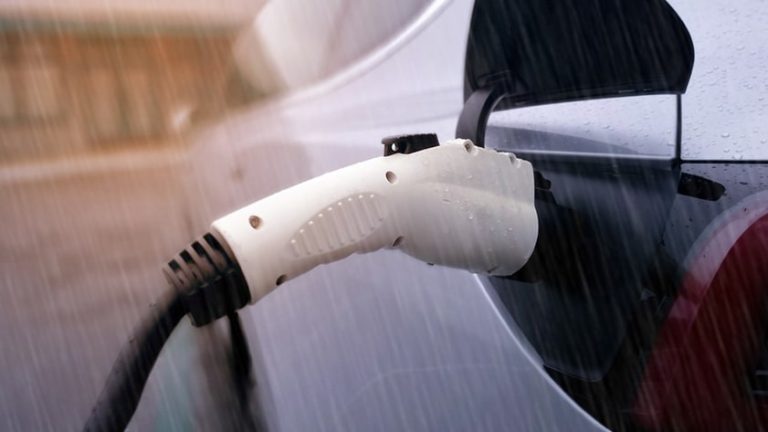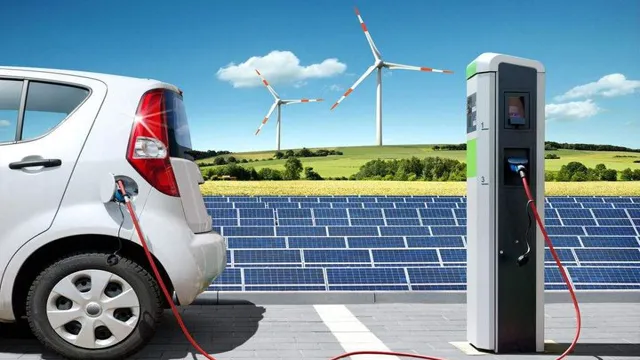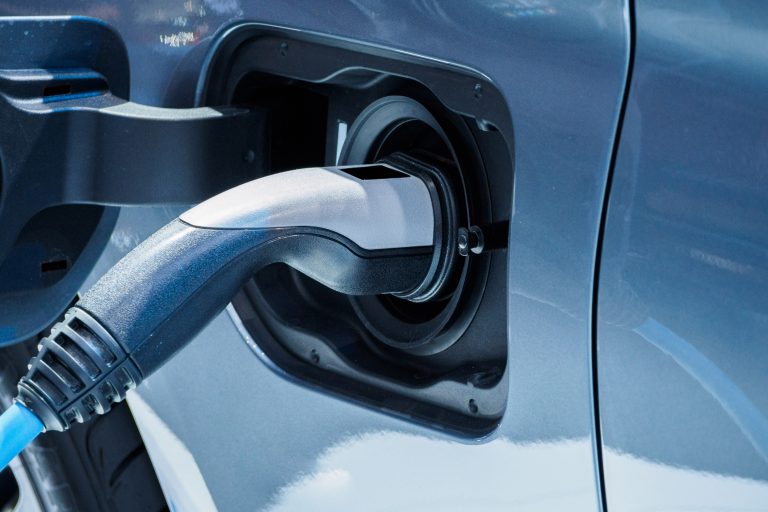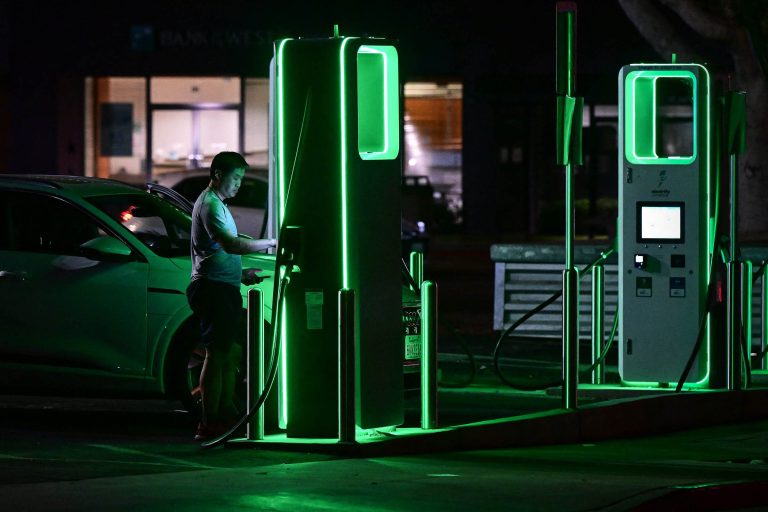Powering the Future: Uncovering the Top UK Electric Car Charging Infrastructure
The rise of electric cars in the UK is nothing short of phenomenal. From being a niche market just a few years ago, the number of EVs on the roads is rapidly increasing, with more drivers making the switch from traditional petrol and diesel vehicles. With the UK government’s recent announcement of its plans to phase out the sale of new petrol and diesel vehicles by 2030, it is clear that the future of UK motoring is electric.
But what does the future hold for electric cars in the UK? Will the country be able to cope with the surge in demand for EVs? Can the infrastructure keep up with the increasing numbers of EVs on the roads? These are just some of the questions being asked by industry experts and consumers alike. However, one thing is for sure: the future of electric cars in the UK is set to be exciting. Not only will there be an increase in the models available, but the technology will also continue to evolve.
With advancements in battery technology, charging times will become shorter and range anxiety will become a thing of the past. Furthermore, the UK government is investing heavily in the development of new charging infrastructure across the country, making it easier for drivers to charge their vehicles. The transition to electric cars is not just about the future of motoring, but it is also about making a positive impact on the environment.
Switching to an EV means fewer emissions and a reduced carbon footprint, making it a greener choice for UK drivers. In conclusion, the future of electric cars in the UK is set to be an exciting one. With the government’s plans to phase out traditional petrol and diesel vehicles, the number of EVs on the roads is set to soar.
Advancements in technology and infrastructure will make owning an EV more accessible and convenient, and the positive impact on the environment cannot be denied. It is an exciting time for motoring in the UK, and electric vehicles are leading the way towards a cleaner and more sustainable future.
Current State of UK Charging
The UK’s electric car charging infrastructure has experienced tremendous growth in recent years. As of August 2021, there are over 25,000 public charging stations, with more being added each month. The majority of these stations are fast chargers, allowing drivers to fully charge their vehicles in as little as 30 minutes, making long-distance travel much more feasible.
The government has also implemented grants and incentives for businesses to install charging stations, encouraging widespread adoption of electric vehicles across the UK. However, despite these efforts, there are still challenges to be addressed, such as ensuring charging stations are located in convenient and accessible areas, and improving interoperability between different charging networks. Overall, the UK’s electric car charging infrastructure is rapidly improving, and we can expect to see even more progress as the demand for electric vehicles continues to grow.
Number of Charging Stations
The current state of UK charging infrastructure for electric vehicles (EVs) is growing rapidly. According to the Department for Transport, there were over 18,000 public EV charging devices available across the UK as of October 202 This number has more than doubled since 2019, demonstrating the significant progress made in expanding the charging network.
However, despite the growth, there are still challenges. The distribution of charging stations is uneven, with concentrated clusters of stations in urban areas and sparse coverage in more rural regions. This can make long-distance travel in an electric vehicle challenging, as drivers may struggle to find charging points along the way.
Additionally, the type of charging station available can also impact the experience of EV drivers. Rapid charging stations, which provide a much quicker charge than traditional fast chargers, are still relatively scarce. This can lead to long wait times or increased journey times for drivers who require a faster charging speed.
Overall, the state of UK charging infrastructure for electric vehicles is improving, but there is still work to be done. Increasing the number of charging stations, particularly rapid chargers, across the UK is crucial to support the growing number of electric vehicles on the road and ensure that drivers can confidently travel long distances.
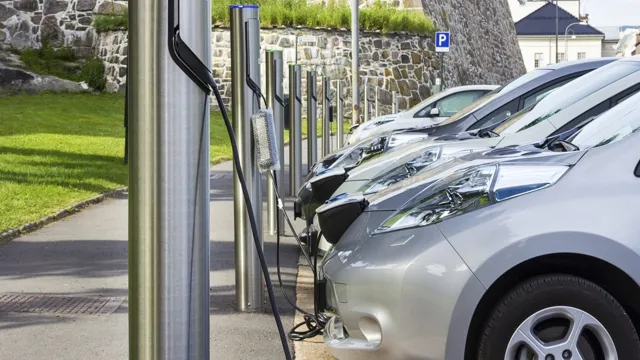
Availability and Ease of Use
Current State of UK Charging and Its Availability and Ease of Use The current state of UK charging systems for electric vehicles can be a bit confusing for some. There are numerous options available, including home charging stations, public charging stations, and even fast-charging networks. However, the availability and ease of use depend on factors such as location, charging infrastructure investments, and a spurt in Electric cars.
Overall, the UK government has been making significant progress in promoting the use of EVs, with the installation of over 24,500 charging ports across the country. This availability is boosted by the collaboration between charging companies and motorway service stations to ensure even remote areas have charging points. In addition, those who lease or purchase an electric car in the UK can benefit from a grant for the installation of home charging points.
Despite the strides in this area, UK drivers are still cautious and require seamless experiences across all charging systems. Therefore, consistent efforts need to be made in alleviating issues arising from empty or faulty charging stations, availability of up-to-date location data, and trustworthy online payment systems.
Types of Chargers Available
The current state of charging in the UK is rapidly evolving, with various types of chargers now available to meet the needs of electric vehicles (EVs). From Level 1 chargers that can fully charge a vehicle in 8-14 hours, to Level 3 rapid chargers that can provide an 80% charge in just 20-30 minutes, there are plenty of options to choose from. However, the availability of chargers varies depending on location, with some areas having a higher concentration of chargers than others.
This is why it’s important for EV owners to research charging options in their area and plan their journeys accordingly. Overall, the increase in charging infrastructure in the UK is a positive sign for the future of EV adoption and sustainable transportation.
Projected Growth of UK Charging
The UK electric car charging infrastructure is set to experience a significant growth over the next few years. With the government’s plan to ban the sale of new petrol and diesel cars by 2030, the demand for electric cars is expected to soar. To accommodate this surge, there are plans to build more than 2,500 ultra-rapid charging stations across the country by 2030.
These stations will be able to recharge an electric car battery in just 20-30 minutes, making long-distance travel practical for electric car owners. In addition to this, there are plans to install thousands of on-street charging points and to offer incentives for workplaces and homes to install chargers. As more and more people switch to electric cars, the demand for charging infrastructure will continue to grow, and it is essential that the UK stays ahead of the curve to meet this demand.
Government Plans and Initiatives
Government Plans and Initiatives The UK government has set an ambitious target of achieving net-zero emissions by 2050. To achieve this, the government has announced a range of measures to accelerate the growth of UK charging infrastructure. The government has invested heavily in the installation of the new charging points across the country.
One such initiative is the On-Street Residential Charge Point Scheme, which provides funding for local councils to install charging points in residential areas. In addition, the government has also introduced the Workplace Charging Scheme, which provides support for businesses to install charging infrastructure for their employees. These measures are expected to contribute significantly to the growth of the UK charging infrastructure, with the number of charging points expected to double by 2030.
This will help to encourage more people to switch to electric vehicles, and ultimately, help the UK to achieve its net-zero emissions target. With the government’s continued investments and initiatives, the future of the UK charging infrastructure looks bright, and the country is well on its way to becoming a leader in sustainable transport.
Private Industry Investment
Private industry investment in the UK’s electric vehicle charging infrastructure is expected to drive significant growth in the coming years. With the government’s ambitious target of phasing out petrol and diesel cars by 2030, there is a massive opportunity for private investors to capitalize on the increasing demand for electric vehicles. Many major players in the industry, such as Shell and BP, are already investing heavily in charging infrastructure to meet this demand, with plans to install thousands of charging points across the UK in the next few years.
This investment not only benefits the environment and helps to reduce our carbon footprint but also presents a unique opportunity for investors to make a difference while generating substantial returns. By investing in charging infrastructure, private companies are fueling the growth of the electric vehicle market, which is projected to continue well beyond 2030, and beyond the UK, as electric vehicle adoption grows globally.
Predicted Number of Charging Stations in the Future
As electric vehicles become more popular, it is natural to wonder about the projected growth of charging stations in the UK. According to recent research, there are currently around 25,000 public charging points across the country, but this number is set to increase dramatically over the next decade. By 2030, it is estimated that there will be around 400,000 charging points available to EV drivers in the UK.
This is because the government is investing millions of pounds in charging infrastructure to support the transition to electric vehicles and reduce carbon emissions. As more people make the switch to electric cars, it is vital that there are enough charging stations to meet demand, and this expansion is a key part of making that happen. So, if you’re considering making the switch to electric, you can rest assured that there will be plenty of charging options available as the industry continues to grow.
Innovations in UK Electric Car Charging
The United Kingdom has seen astonishing innovations in its electric car charging infrastructure in recent years. The development of new technologies, such as ultra-fast chargers and wireless charging, has made electric vehicles more accessible and convenient for drivers across the country. In addition to these technological advances, major investments have been made in expanding the number of charging points available in urban and rural areas alike.
This has not only helped promote the use of electric vehicles but also address concerns over range anxiety among drivers. With a rapidly growing network of charging stations and advancements in technology, it’s clear that the UK is committed to leading the way in sustainable transportation. As more people turn to electric vehicles, the demand for convenient and efficient charging infrastructure will continue to grow, and the UK is well-equipped to meet those needs, now and in the future.
Wireless Charging Technology
Wireless Charging Technology, UK Electric Car Charging Innovations in UK electric car charging have been recently focused on the integration of wireless charging technology. With this technology, electric car owners no longer have to rely on traditional plugs and cords to fuel up their vehicles. Instead, they can simply park their car over a wireless charging pad and let the technology do the work.
Not only is this a more convenient option for drivers, but it also helps to eliminate the clutter and hazards of cords and cables that can be found at traditional charging stations. And with the push towards a more sustainable future, wireless charging technology is a step in the right direction to reduce emissions and decrease our reliance on fossil fuels. As the popularity of electric vehicles continues to grow, innovations like this will become more important than ever to provide efficient and accessible charging options for drivers.
Fast Charging Solutions
When it comes to electric cars, one of the biggest concerns for drivers is the amount of time it takes to charge their vehicles. Fortunately, innovative solutions for fast charging are becoming more available in the UK, making electric cars more practical and convenient than ever before. One of the newest developments in fast charging is the use of ultra-fast chargers, which can charge an electric car battery from 20% to 80% capacity in as little as 30 minutes.
Another exciting innovation is wireless charging, in which an electric car charges simply by parking over a magnetic pad. With these new innovations, electric car drivers in the UK can enjoy the benefits of low-cost, sustainable transportation without having to sacrifice convenience or time.
Impact of UK Electric Car Charging
The UK electric car charging infrastructure is rapidly advancing and has the potential to make a significant impact on reducing the nation’s carbon emissions. With the government pledging to ban the sale of new petrol and diesel cars by 2030, the need for reliable charging infrastructure is more important than ever. The current infrastructure has over 20,000 public charging points, from rapid charging to standard speed.
Moreover, the UK has signed a Memorandum of Understanding with Norway, outlining plans to establish a new high-capacity subsea electricity cable between the two countries. This cable would enable the UK to import excess renewable energy from Norway during periods of high demand. The potential for electric cars to reduce greenhouse gas emissions is enormous, and the UK is making significant strides in building the necessary infrastructure to support the transition.
By incentivizing the use of electric vehicles and investing in their infrastructure, the UK is well on its way to becoming a leader in sustainable transportation.
Conclusion
In conclusion, the UK’s electric car charging infrastructure is a reflection of our society’s shift towards a more sustainable future. While some may argue that it’s still in its infancy, the growth and development of EV charging stations across the country is undeniable. From roadside charging points to high-powered superchargers, the UK is making strides towards a cleaner, greener, and more efficient means of transportation.
So next time you plug in your electric vehicle, take a moment to appreciate the innovation and progress that has brought us this far. Who knows, maybe one day we’ll look back on petrol stations with the same nostalgic fondness that we now reserve for cassette tapes and rotary dial phones.”
FAQs
What is the current state of the UK’s electric car charging infrastructure?
The UK’s electric car charging infrastructure currently consists of over 24,000 charging points, and the government has set a target of having at least 6 charging points per 10,000 people by 2025.
How much does it cost to charge an electric car in the UK?
The cost of charging an electric car in the UK varies depending on the location, the type of charging station, and the size of the car’s battery. On average, it costs around 15p-25p per kWh.
How fast can an electric car be charged in the UK?
The charging speed of an electric car depends on the type of charging station and the car’s battery capacity. Fast chargers can provide a range of up to 100 miles in just 30 minutes, while rapid chargers can provide up to 80% charge in around 30 minutes.
Are there any plans to expand the UK’s electric car charging infrastructure?
Yes, the UK government has committed £1.3 billion to support the expansion of the country’s electric car charging infrastructure. This includes funding for the installation of more fast and rapid chargers, as well as the development of wireless charging technology.

